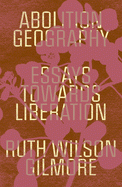Para envío
The first collection of writings from one of the foremost contemporary critical thinkers on racism, geography and incarceration
Gathering together Ruth Wilson Gilmore's work from over three decades, Abolition Geography presents her singular contribution to the politics of abolition as theorist, researcher, and organizer, offering scholars and activists ways of seeing and doing to help navigate our turbulent present.
Abolition Geography moves us away from explanations of mass incarceration and racist violence focused on uninterrupted histories of prejudice or the dull compulsion of neoliberal economics. Instead, Gilmore offers a geographical grasp of how contemporary racial capitalism operates through an "anti-state state" that answers crises with the organized abandonment of people and environments deemed surplus to requirement. Gilmore escapes one-dimensional conceptions of what liberation demands, who demands liberation, or what indeed is to be abolished. Drawing on the lessons of grassroots organizing and internationalist imaginaries, Abolition Geography undoes the identification of abolition with mere decarceration, and reminds us that freedom is not a mere principle but a place.
Edited with an introduction by Brenna Bhandar and Alberto Toscano.
"Ruth Gilmore, indefatigable activist-scholar, is one of our most dangerous and important minds. A radical geographer with roots in the Black liberation movement of the 1960s and 1970s, she pioneered the study of mass incarceration's catastrophic impacts on inner-city families and neighborhoods, and together with Angela Davis has played a catalytic role in the creation of today's movement for prison abolition. This powerful collection of essays is an indispensable conceptual armory for that struggle."
--Mike Davis
"Ruthie's clarity and courage is a talisman for these monstrous times, and a guide out of them."
--Vijay Prashad, director, Tricontinental: Institute for Social Research
"Abolition geography isn't shallow romanticism. It is a rigorous criticism of capitalist social relations, which foment premature death and needless suffering of the poor and destroy the planet. Abolition geography is a human necessity for there to be freedom and a livable earth. Ruth Wilson Gilmore, one of the foremost revolutionary thinkers on abolition, draws on real historical traditions of getting free, showing us what is possible and necessary."
--Nick Estes, author of Our History Is the Future
"This well-crafted assemblage of thirty years worth of Ruthie Gilmore's countless, brilliant interventions is a tremendous gift to our movements. While tending to grounded practices and particularities, Ruthie's meticulous mapping of interconnected histories offers us prescient analyses across scale, geography, and time. At a time of incredible uncertainty and global upheaval, Abolition Geography illuminates a political vocabulary and vision that reorganizes even conventional left ideologies; a tour de force and absolute must read for our collective trajectories of freedom making as world making."
--Harsha Walia, author of Border and Rule and Undoing Border Imperialism
"The leaderly wisdom of Ruth Wilson Gilmore infuses this hefty volume, making it an indispensible compendium of practical abolitionism. In her hands, reducing police powers and dismantling the prison industrial complex become immediate matters of political struggle. If you want to come to terms with the movement that shaped the 'American Summer' of 2020, this is the best available starting point."
--Paul Gilroy, author of The Black Atlantic
"Ruth Wilson Gilmore is one of the most impactful radical thinkers of our time. This compilation of thirty years' worth of essays, interviews, and co-written reflections, is evidence of the depth and breadth of her extraordinary political praxis. Powerful, provocative, inspiring and inciting, this edited collection offers a formidable indictment of racial capitalism and the carceral state, a deep, complex and multi-faceted portrait of abolitionist work, and a call to action. Readers concerned with freedom-making and liberation will read this brilliant body of work carefully and act decisively."
--Barbara Ransby, activist, historian and author of several books, including Making All Black Lives Matter and Ella Baker and the Black Freedom Movement
" Abolition Geography is a collection of three decades of Ruth Wilson's Gilmore's brilliance in the form of essays and interviews on the politics of abolition as a theorist, researcher and organizer. The result is a precious gift that will be read, studied and cherished for years to come by those of us who believe her when she says to be green we must be red, and to be red our world building must be planetary."
--Leanne Betasamosake Simpson, author of Noopiming: The Cure for White Ladies
"An essential collection of writings from one of the most important thinkers on abolition, geography and racism of our time."
--Karla J. Strand, Ms.Magazine ("Most Anticipated Reads of 2022")
" Abolition Geography is the first collection of writing by this major thinker, activist, and writer in the fields of racism, geography, and incarceration. The book includes essays, articles, and interviews from the last two decades, covering topics such as the origin of mass incarceration and racial violence and the concept of the 'anti-state state.'"
--Autostraddle
"Anyone with an interest in the critical theory of mass incarceration and social justice can't miss this first-ever compendium of writing by one of the most brilliant and radical minds in the field. [An] impactful guidebook for a whole new generation looking to join the movement."
--The Chicago Review of Books



